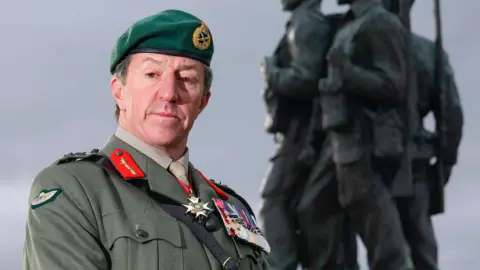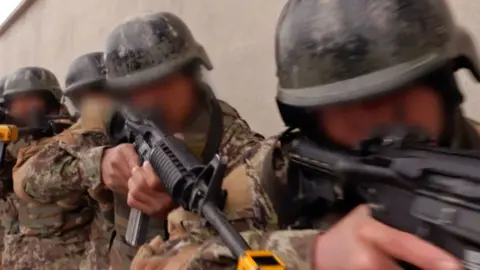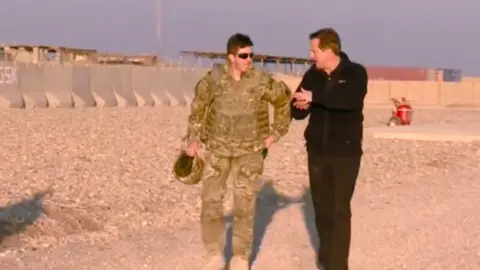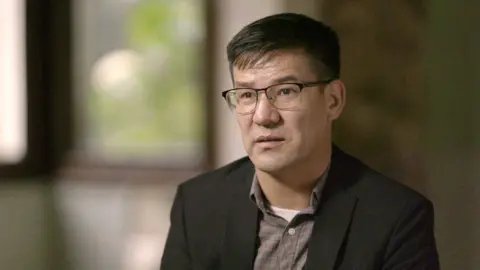Top UK Special Forces general oversaw blocking of Afghan ‘war-crime’ witnesses to Britain
20 minutes agoHannah O’Grady and Joel GunterBBC Panorama

 MOD
MODA top general who failed to report evidence of alleged SAS war crimes in Afghanistan later oversaw the rejection of hundreds of UK resettlement applications from Afghan commandos who served with the elite regiment, BBC Panorama can reveal.
Gen Sir Gwyn Jenkins led UK Special Forces (UKSF) in Afghanistan at a time when alleged war crimes were committed. He later appointed a UKSF officer under his command, who had also served in Afghanistan, to assess the Afghan commando applications after special forces headquarters was given a controversial veto over them.
Thousands of applications from individuals with credible evidence of service with Afghan Special Forces, including the units known as the Triples, were then rejected, leaving many of the former commandos at the mercy of the Taliban.
The rejections are controversial because they came at a time when a judge-led public inquiry in the UK had begun investigating the SAS for alleged war crimes on operations on which the Triples were present.
If the Afghan commandos were in the UK, they could be called as witnesses – but the inquiry has no power to compel testimony from foreign nationals who are overseas.
Some of those denied visas were subsequently tortured and killed by the Taliban, according to former colleagues, family members and lawyers.
According to internal emails and testimony from within the Ministry of Defence (MoD), obtained by Panorama, the UK Special Forces officer appointed by Gen Jenkins stood over civil service caseworkers from the resettlement scheme and instructed them to reject the Triples applications, one after another, on what sources described as spurious grounds.
A senior government source close to the process told the BBC that the UK Special Forces officer “would never have acted without direction”, adding that “everything would have gone through Gwyn Jenkins”.


At the time, in 2021-22, Gen Jenkins was the head of all UK Special Forces. He is now the chief strategic adviser to the Defence Secretary John Healey and is tipped to take over as First Sea Lord – the head of the Royal Navy.
Gen Jenkins was made aware of allegations that the SAS was committing extrajudicial killings in Afghanistan, but he failed to report the allegations to military police – Panorama has previously revealed – despite a legal obligation to do so. The suspected unlawful killings continued.
Panorama has now heard eyewitness testimony from veterans who served in UK Special Forces detailing alleged war crimes stretching over more than a decade and involving the SBS as well as the SAS.
Gen Jenkins did not respond to the BBC’s request for comment on this story. The MoD responded on his behalf. It said in a statement that there is no evidence it has tried to prevent former Afghan troops giving evidence to the Inquiry and that “anyone can provide evidence… no matter where in the world they are”.
The MoD added that it was “fully committed to delivering on our pledge to relocate and resettle eligible Afghans and their families to the UK”.
“Each resettlement application is decided on its own merits against the criteria outlined in the ARAP [Afghan Relocations and Assistance Policy] and immigration rules,” the statement said.
The rejections of the Triples applications left caseworkers from the ARAP scheme questioning the validity of the process, given that many of the applications contained compelling evidence of service alongside British special forces.
Hundreds of rejections have since been overturned following a government review.
A letter obtained by Panorama shows that concerns were raised among cabinet ministers in January 2024 over the existence of the UK Special Forces’ veto over the Triples applications.
The then Veterans Minister Johnny Mercer wrote to senior Conservatives to say the role of UKSF in denying the applications was “deeply inappropriate” and “a significant conflict of interest, that should be obvious to all”.
He had been compelled to write, he added, because he had been shown evidence “that 5 members of these units have been killed having been rejected for resettlement”.
Mr Mercer, who served alongside the SBS in Afghanistan before becoming an MP, went on to warn that the role of UKSF in the process had a “very high chance of being exposed by the Afghan Inquiry”, which could “lead to serious questions of all those Ministers involved in the process”.
The Triples units – so-called because their designations were CF 333 and ATF 444 – were set up, trained, and paid by UK Special Forces and supported the SAS and SBS on operations targeting Taliban leaders in Afghanistan.
When the country fell to the Taliban in 2021, they were judged to be in grave danger of reprisal and were entitled to apply for resettlement to the UK.
But, according to MoD documents obtained by Panorama, thousands of ARAP applications containing credible evidence of service alongside UK Special Forces were subsequently rejected.


BBC Panorama first revealed last year that it had been UK Special Forces – the very force that trained and served with the Triples – that rejected them.
“We heard some of our Triples were already killed by the Taliban,” said Jumakhan Joya, a former Afghan special forces commanding officer. “Some of them are in jail in a Taliban prison. Some of them have already been disabled by the Taliban. They’re breaking their hands, their legs, their head,” he said.
Mr Joya told the BBC he believed that the existence of the public inquiry was the “only reason” their applications had been vetoed.


The rejections and reported reprisals have outraged some former members of British special forces. “What’s happened is horrendous. It is a betrayal and it shames us all,” one former UK Special Forces officer told Panorama.
Asked by Panorama about the government’s rejection of Triples’ applications, Bruce Houlder KC, who as a former director of service prosecutions was responsible for bringing charges against members of the armed forces, said the government must have known the Triples would have “highly relevant” evidence that would be “much easier to obtain” if they were in the UK.
“I can’t think of any fair reason why we should exclude people from their right to live in this country, which is extended to others, simply because they might be in possession of information which would embarrass special forces,” Mr Houlder said.
“If that is the reason, it’s disreputable and it can’t be supported in any way.”
Get in touch using SecureDrop, a highly anonymous and secure way of whistleblowing to the BBC which uses the TOR network.
Or by using the Signal messaging app, an end-to-end encrypted message service designed to protect your data.
SecureDrop or Signal: 0044 7714 956 936
Please note that the SecureDrop link will only work in a Tor browser. For information on keeping secure and anonymous, here’s some advice on how to use SecureDrop.
It’s proved a really important way for people to get in touch with us in the past.